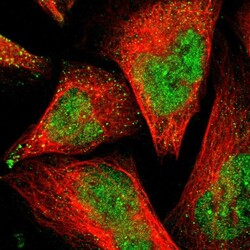Antibody data
- Antibody Data
- Antigen structure
- References [8]
- Comments [0]
- Validations
- Immunocytochemistry [1]
Submit
Validation data
Reference
Comment
Report error
- Product number
- HPA002114 - Provider product page

- Provider
- Atlas Antibodies
- Proper citation
- Atlas Antibodies Cat#HPA002114, RRID:AB_1855850
- Product name
- Anti-PSMD14
- Antibody type
- Polyclonal
- Description
- Polyclonal Antibody against Human PSMD14, Gene description: proteasome (prosome, macropain) 26S subunit, non-ATPase, 14, Alternative Gene Names: pad1, POH1, Rpn11, Validated applications: ICC, IHC, WB, Uniprot ID: O00487, Storage: Store at +4°C for short term storage. Long time storage is recommended at -20°C.
- Reactivity
- Human, Mouse, Rat
- Host
- Rabbit
- Conjugate
- Unconjugated
- Isotype
- IgG
- Vial size
- 100 µl
- Concentration
- 0.2 mg/ml
- Storage
- Store at +4°C for short term storage. Long time storage is recommended at -20°C.
- Handling
- The antibody solution should be gently mixed before use.
Submitted references Quantitative measurement of the requirement of diverse protein degradation pathways in MHC class I peptide presentation
PSMD14 stabilizes estrogen signaling and facilitates breast cancer progression via deubiquitinating ERα
The prognostic role of PSMD14 in head and neck squamous cell carcinoma
Blockade of deubiquitinating enzyme PSMD14 overcomes chemoresistance in head and neck squamous cell carcinoma by antagonizing E2F1/Akt/SOX2-mediated stemness
POH1 contributes to hyperactivation of TGF-β signaling and facilitates hepatocellular carcinoma metastasis through deubiquitinating TGF-β receptors and caveolin-1
POH1 deubiquitylates and stabilizes E2F1 to promote tumour formation
Multiple components of the spliceosome regulate Mcl1 activity in neuroblastoma
Tissue profiling of the mammalian central nervous system using human antibody-based proteomics.
Mamrosh J, Sherman D, Cohen J, Johnston J, Joubert M, Li J, Lipford J, Lomenick B, Moradian A, Prabhu S, Sweredoski M, Vander Lugt B, Verma R, Deshaies R
Science Advances 2023;9(25)
Science Advances 2023;9(25)
PSMD14 stabilizes estrogen signaling and facilitates breast cancer progression via deubiquitinating ERα
Yang P, Yang X, Wang D, Yang H, Li Z, Zhang C, Zhang S, Zhu J, Li X, Su P, Zhuang T
Oncogene 2023;43(4):248-264
Oncogene 2023;43(4):248-264
The prognostic role of PSMD14 in head and neck squamous cell carcinoma
Schnoell J, Scheiflinger A, Al-Gboore S, Kadletz-Wanke L, Kenner L, Heiduschka G, Jank B
Journal of Cancer Research and Clinical Oncology 2022;149(6):2483-2490
Journal of Cancer Research and Clinical Oncology 2022;149(6):2483-2490
Blockade of deubiquitinating enzyme PSMD14 overcomes chemoresistance in head and neck squamous cell carcinoma by antagonizing E2F1/Akt/SOX2-mediated stemness
Jing C, Duan Y, Zhou M, Yue K, Zhuo S, Li X, Liu D, Ye B, Lai Q, Li L, Yao X, Wei H, Zhang W, Wu Y, Wang X
Theranostics 2021;11(6):2655-2669
Theranostics 2021;11(6):2655-2669
POH1 contributes to hyperactivation of TGF-β signaling and facilitates hepatocellular carcinoma metastasis through deubiquitinating TGF-β receptors and caveolin-1
Wang B, Xu X, Yang Z, Zhang L, Liu Y, Ma A, Xu G, Tang M, Jing T, Wu L, Liu Y
EBioMedicine 2019;41
EBioMedicine 2019;41
POH1 deubiquitylates and stabilizes E2F1 to promote tumour formation
Wang B, Ma A, Zhang L, Jin W, Qian Y, Xu G, Qiu B, Yang Z, Liu Y, Xia Q, Liu Y
Nature Communications 2015;6(1)
Nature Communications 2015;6(1)
Multiple components of the spliceosome regulate Mcl1 activity in neuroblastoma
Laetsch T, Liu X, Vu A, Sliozberg M, Vido M, Elci O, Goldsmith K, Hogarty M
Cell Death & Disease 2014;5(2):e1072-e1072
Cell Death & Disease 2014;5(2):e1072-e1072
Tissue profiling of the mammalian central nervous system using human antibody-based proteomics.
Mulder J, Björling E, Jonasson K, Wernérus H, Hober S, Hökfelt T, Uhlén M
Molecular & cellular proteomics : MCP 2009 Jul;8(7):1612-22
Molecular & cellular proteomics : MCP 2009 Jul;8(7):1612-22
No comments: Submit comment
Supportive validation
- Submitted by
- Atlas Antibodies (provider)
- Main image

- Experimental details
- Immunofluorescent staining of human cell line U-2 OS shows localization to nucleoplasm & vesicles.
- Sample type
- Human
 Explore
Explore Validate
Validate Learn
Learn Western blot
Western blot Immunocytochemistry
Immunocytochemistry